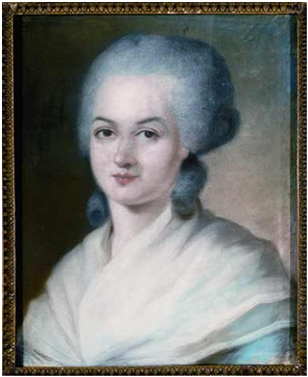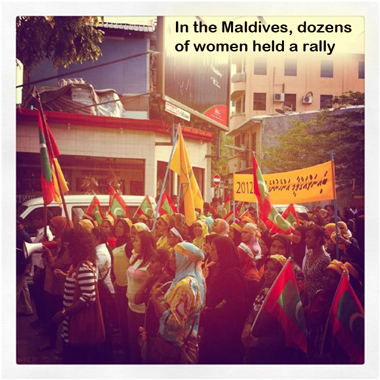From Olympe de Gouges to Women Demanding Rights Worldwide
“A woman has the right to mount the scaffold. She must possess equally the right to mount the rostrum [speaker’s platform].”
Olympe de Gouges was an 18th Century French playwright and political activist way ahead of her time, and her feminist and abolitionist writings stirred political discourse in ways that presaged uprisings by women around the world last week.
Disenchanted when equal rights were not extended to women after the outbreak of the French Revolution, Olympe de Gouges wrote a Declaration of the Rights of Woman and the Female Citizen. Modeled on the 1789 Declaration of the Rights of Man and of the Citizen by the National Assembly, De Gouges’ Declaration echoed the same language, replacing ‘Man’ with ‘Woman’.
 De Gouges argued that the rights revolutionaries were attempting to expand for men should be extended to women as well. She passionately insisted upon universal suffrage, legal equality in marriage, women’s right to divorce in cases of abuse and her right to property and custody of her children, among other things. In her postscript, Gouges exhorted women to awaken to consciousness of their rights to embrace their power. She encouraged them to step up, take action and demand equality.
De Gouges argued that the rights revolutionaries were attempting to expand for men should be extended to women as well. She passionately insisted upon universal suffrage, legal equality in marriage, women’s right to divorce in cases of abuse and her right to property and custody of her children, among other things. In her postscript, Gouges exhorted women to awaken to consciousness of their rights to embrace their power. She encouraged them to step up, take action and demand equality.
Sound familiar?
Stepping up is just what women in Egypt were doing last Thursday, March 8, as they marched from the Journalists’ Syndicate to parliament. The rally, organized by 16 feminist NGOs, came together around the demand that women make up 50% of the constituent assembly in parliament. In the 2011 lower house elections, only 2% of the 508 seats in Egypt’s parliament were allocated to women—even though women were prominently, and courageously, involved with the Tahrir Square uprising.
Egyptian human rights lawyer Ragia Omran explained, “Personal status laws, which refer to women’s rights in divorce for example, need to be changed in the next constitution”. She added that this would be more likely if there were more women involved in its writing.
Egyptian women were not the only ones to take their demands to the street last Thursday. Women in Fiji, the Maldives, California, Canada and Israel called to public attention everything from police brutality to sexual assault to women workers’ rights.
Though their national situations and particular demands were inevitably varied, the female demonstrators of last Thursday all had one thing in common. In taking to the streets, they cemented the place of their voices, concerns and needs within the public dialogue.
The movement toward true equality under the law continues as it always has, with intermittent backslides as well as positive developments. It is heartening to know that there have always and will always be women who insist upon raising their political voices, who make known their visions of a more equal society, and who are willing to take the action necessary to make it happen.

GLORIA FELDT is the New York Times bestselling author of several books including No Excuses: 9 Ways Women Can Change How We Think About Power, a sought-after speaker and frequent contributor to major news outlets, and the Co-Founder and President of Take The Lead. People has called her “the voice of experience,” and among the many honors she has been given, Vanity Fair called her one of America’s “Top 200 Women Legends, Leaders, and Trailblazers,” and Glamour chose her as a “Woman of the Year.”
As co-founder and president of Take The Lead, a leading women’s leadership nonprofit, her mission is to achieve gender parity by 2025 through innovative training programs, workshops, a groundbreaking 50 Women Can Change The World immersive, online courses, a free weekly newsletter, and events including a monthly Virtual Happy Hour program and a Take The Lead Day symposium that reached over 400,000 women globally in 2017.

